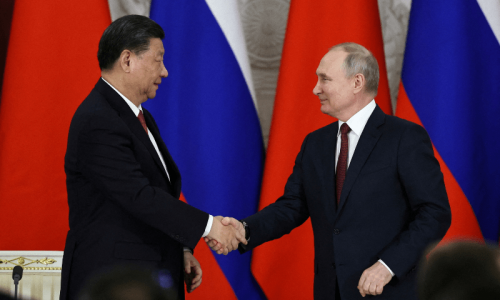COLOMBO: The government of President Chandrika Kumaratunge once again finds itself in a tangle with her coalition nationalistic party, the Janatha Vimukthi Peramuna (JVP), stoically opposing the current peace moves planned out by the government.
Somawansa Amarasinghe, the leader of the Marxist chief coalition party of the government, on Tuesday said that the JVP would categorically oppose the signing of the Joint Mechanism, a planned out agreement between the Tamil Tigers and the government to distribute humanitarian assistance to the Tamil populated northeast.
The JVP leader meanwhile urged the international community to give Sri Lanka also a ‘roadmap’ which would lead to a permanent solution to the ethnic crisis stating that the government was at present being ‘dictated to’ by various quarters of the international community.
He stated that the JVP was reluctant to support the peace process as it was not sure of the final result and voiced fears of the proposed Joint Mechanism clearing the path for the LTTE’s craving for a separate Tamil state.
The JVP leader told a news conference in Colombo that the proposed joint mechanism with the LTTE was just another way of achieving the controversial interim self-governing authority (ISGA), that is seen as a blue print for a separate Tamil State declaring that the government had no right to agree to it.
“A responsible government elected by the people had no right to share the power of handling public money with a terrorist group which had no mandate except its weapons”, he said launching a bitter tirade on the LTTE’s terror activities.
Mr Amarasinghe said his party believed the joint mechanism while giving excessive powers to the LTTE would make matters worse in the North-East and further isolate the Tamil people.
Meanwhile, the government’s Muslim ally, the National Unity Alliance joined in the fray opposing the Joint mechanism when its leader Mrs Farial Ashraff told the visiting Norwegian peace facilitator, Erik Solheim last week that her party opposed the agreement as it will isolate the Muslims in the North East.
These sentiments by Mrs Ashraff came three days before the radical political party comprising of Buddhist monks, the Jathika Hela Urumaya (JHU) announced that it would fight tooth and nail to prevent the agreement from being signed.
This unanimous opposition towards what is seen as the only chance to inject some life into the peace process stalled since 2003 April tests the strength of Norway, the peace facilitator. The five day visit of Erik Solheim to the country last week was (as announced by Mr Solheil) for the purpose of getting the joint mechanism off the ground but his failure to convince the government’s coalition partners and other political parties to support the move bespeaks doom to the already mired peace process.
Norway is also seen as having failed heavily in getting the LTTE to refrain from carrying out its assassination spree in the east. With the rebels’ internal warfare with its renegade militant Karuna giving it a free license to carryout its killing spree it is, as a journalist in the region said a syndrome where there is a ‘killing a day’.
The latest in regard to the LTTE’s violations of the ceasefire agreement is the shootings directed within the last fortnight at the government military camps in the east.
Although the LTTE on several incidents had shrugged off these complaints made by the Sri Lankan military to the Nordic truce monitors claiming that they were ‘accidental’, the military spokesperson in Colombo, Brigadier Daya Ratnayake insisted that the LTTE was trying to provoke the military towards war.
“It is clear from their action that the LTTE wants us to react”, Brigadier Daya Ratnayake said his statements co-inciding with those of the Acting Minister of Defence, Ratnasiri Wickremenayake, who lashed at the LTTE last week stating that the rebels were trying to force the government into a war.
No press statement was issued by LTTE to the media in this regard nor about the opposition the government faced with regard to the formation of a joint agreement.











































Dear visitor, the comments section is undergoing an overhaul and will return soon.